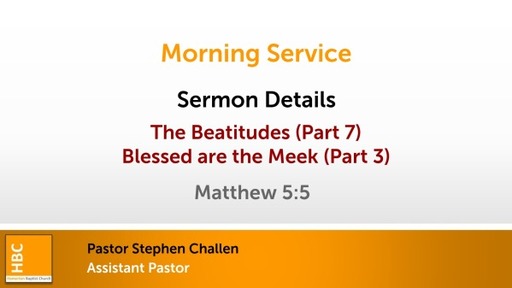The Beatitudes (Part 7): Blessed are the Meek (Part 3)

Morning 30 April 2023
Order of Service
Welcome
Hymn -
Psalm Reading
Prayer
Teen Talk
Hymn -
Notices
Main Prayer
Birthdays
Prayer Items
Hymn -
Sermon Search
Reading
Sermon
Meekness in Action
the nineteenth-century Christian philanthropist George Múller replied, ‘There was a day when I died, utterly died; died to George Múller, his opinions, preferences, tastes and will—died to the world, its approval or censure—died to the approval or blame even of my brethren and friends—and since then I have studied only to show myself approved unto God.’
Meekness remains unprovoked by criticism
John Stott makes the point perfectly: ‘I myself am quite happy to recite the General Confession in church and call myself a “miserable sinner”. It causes me no great problem. I can take it in my stride. But let somebody else come up to me after church and call me a miserable sinner, and I want to punch him on the nose!’
Martyn Lloyd-Jones hits the nail on the head when he says, ‘To be truly meek means that we no longer protect ourselves, because we see there is nothing worth defending.’
we must resist the temptation to be proved right in everything we say or to insist that our view of things is the only right one, whether it be an issue of doctrine, morality, ethics, the church, business, politics or anything else.
South African preacher Frank Retief points us in the right direction: ‘Take the opportunity of restoring broken relationships. Make whatever apologies are necessary. Be willing to eat humble pie and don’t be caught up in the pettiness of who said what and when and who was wrong or right. I have often made the observation that five minutes before I die, it will not matter one whit to me who won the last argument. I will have other things of far greater importance on my mind.’
Meekness accepts personal injury without resentment
Meekness in the face of personal injury runs counter to our natural inclination, which is to retaliate—sometimes with interest!—but it is just as much a Christian’s duty to avoid taking offence as it is to avoid giving offence.
Meekness bears patiently with the unfaithfulness of friends
Meekness deals lovingly but firmly with the lost
Faced with an argumentative unbeliever, we can quickly find ourselves adopting the same hostile spirit and getting involved in a verbal brawl, forgetting that even if we won every round and convinced the other person at every point, we might do so in such a way as to leave him even more determined to have nothing to do with a religion that produces people like us.
Meekness deals lovingly but firmly with the sin of believers
Defining Meekness
Meekness is a defining grace, produced by the Holy Spirit in the life of the Christian, which characterizes that person’s response towards God and man.
Meekness towards God is a spirit of submission to all of God’s dealings with us, especially those which cause us sorrow or pain, in the settled conviction that in all of these he is graciously, wisely and sovereignly working ‘for the good of those who love him’ (Romans 8:28).
Meekness towards man means bearing patiently with the hurtful actions of others and dealing gently with their failures, not only in the assurance that all of these are under God’s providential control, but in the knowledge that, left to ourselves, we have no claim to be any stronger than the weakest of our friends or any better than the worst of our enemies.
They Shall inherit the Earth
As A W Pink neatly puts it, ‘The humble Christian is far happier in a cottage than the wicked in a palace.’
True riches in Christ
Meekness is not looking back and seeing this in retrospect. It is approaching each day, each new set of circumstances, in the settled conviction that, in David’s famous phrase, ‘Surely goodness and mercy shall follow me all the days of my life, and I will dwell in the house of the Lord for ever’ (Psalm 23:6, NKJV)
